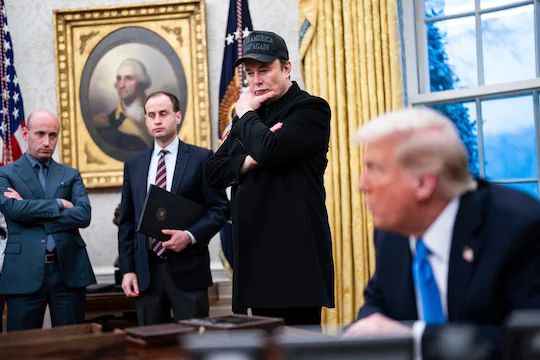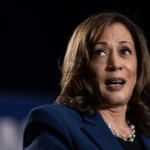Exactly how does Elon Musk know what “the people” want?
During his appearance in the Oval Office on Tuesday, Musk presented public opinion as the standard against which his team’s Trump-approved evisceration of government programs was being measured. He insisted that there existed an “unelected, fourth, unconstitutional branch of government, which is the bureaucracy” and described why he felt that it needed to be brought to heel.
“If there’s not a good feedback loop from the people to the government, and if you have rule of the bureaucrat — if the bureaucracy is in charge, then what meaning does democracy actually have?” Musk told reporters. “If the people cannot vote and have their will be decided by their elected representatives in the form of the president and the Senate and the House, then we don’t live in a democracy. We live in a bureaucracy.”
This is a very “Elon Musk” thing to say. It sounds clever, in the manner of a college-debate-club participant: bureaucracy and democracy end in the same suffix! But it’s just sophistry. Musk is implying that bureaucracy — the administration of a democratic government serving 330 million people — has replaced democracy not because it has but because he is trying to advocate for gutting huge portions of that administrative effort.
He seeks to gut the government, mind you, through unilateral executive authority masquerading as popular democracy — better known as Trumpism. Musk’s claim that the bureaucracy somehow sprang into being outside public will ignores that it is the slowly accrued product of agreement between the elected representatives he disparages. It’s imperfect, but it’s hardly less democratic than Musk’s standard, which is “what Musk (and perhaps Trump) thinks people want.”
“Your tax dollars need to be spent wisely on things that matter to the people.” Musk said at another point. His process, he added, was to “look at each of the expenditures and say: ‘Is this actually in the best interest of the people?’ And if it is, it’s approved. If it’s not, we should think about it.”
This is not up to him or Trump to determine, which we’ll get into in a moment. Instead, let’s return to the initial question: How does he know what the people want?
In the past, he’s used unscientific polls on his social media platform, X, to establish what he presents as popular opinion. Hopefully, he’s smart enough to be doing so out of cynicism, the priest knowingly asking the choir for their thoughts. It’s quite possible, though, that he does so out of ignorance — that he actually thinks the platform he bought and manipulates is an encapsulation of what Americans believe.
Consider how he defended his assertion that Trump had a mandate to act on behalf of the people.
“You couldn’t ask for a stronger mandate from the public,” Musk said of the 2024 presidential election. “The public voted — you have a majority of the public voting for President Trump.” Those voters, he added later, “are going to get what they voted for. That’s what democracy is all about.”
Donald Trump did not get a majority of the public to vote for him. He didn’t even get a majority of voters to vote for him. And while a significant portion of those who did certainly approved of the idea that Trump would overhaul the government, many were voting for other reasons.
Polling — that is, actual scientific polling — already shows deep skepticism about Musk’s efforts. YouGov, for example, determined that 4 in 10 Americans think Musk should have no influence in the administration. For every two Republicans who think Musk should have a lot of influence over the administration, one thinks he shouldn’t have any influence at all.
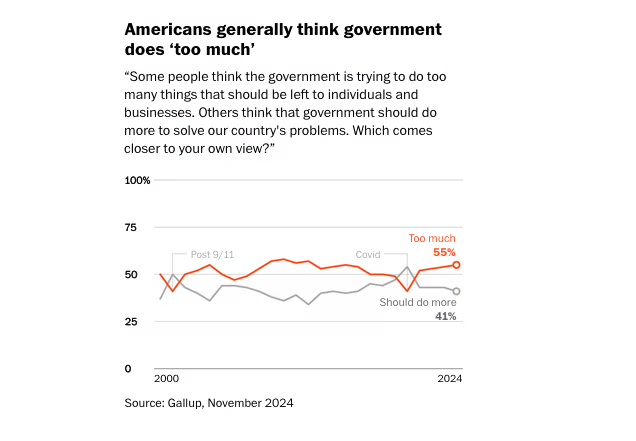
Some of this is just about Musk himself. Americans viewed him relatively favorably soon after the election, according to YouGov polling, but that’s faded significantly. Polling conducted by YouGov for CBS News, though, shows that 3 in 10 Americans think the Trump administration’s focus on cutting spending has gone too far while 4 in 10 think that the cuts to foreign aid programs have been excessive.
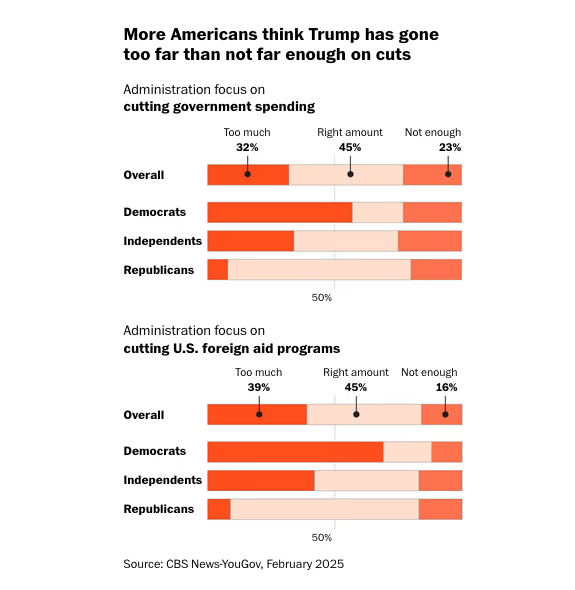
The flip side of those numbers, of course, is that nearly everyone else thinks either that the focus has been appropriate or even too modest. At this point we note that polls are necessarily imprecise. This one asked about “cutting government spending” instead of, say, “denying an elderly woman access to oxygen” or “letting half a billion dollars in food aid spoil” or “eviscerating spending that aids cancer research.”
That’s the most important caveat here: Most of what Musk and his team have done to date has been abstract to most Americans. But there’s a reason the bureaucracy exists at the scale it does, which is that constituencies and advocates have convinced representatives that those programs are worth funding. As Musk himself pointed out, when funding stops, complaints start. We can anticipate a staggering number of complaints over the coming months.
Remember, too, that many Americans think the government should do more than it already does. In Gallup polling released shortly after the election, 4 in 10 respondents said that they thought the government should be more active in solving the country’s problems, in line with historic patterns.
That included about 1 in 6 Republicans.
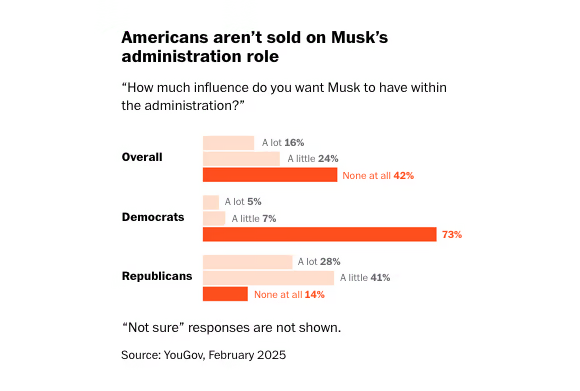
Americans generally think government does ‘too much’
“Some people think the government is trying to do too many things that should be left to individuals and businesses. Others think that government should do more to solve our country’s problems. Which comes closer to your own view?”
Trump and Musk are somewhat insulated against blowback from the likely negative ramifications of these cuts by the bubble of disinformation that surrounds and protects the administration. (On one Fox News show on Monday, a commentator wondered why reporters didn’t simply “repeat, retweet, repost” what the White House was saying since “that is the facts.”) Unfortunately for everyone else, that Republican-centric bubble also appears to be the source of Musk’s concept of what constitutes the will of the people.
Not that we can take Musk’s rhetoric about his decision-making at face value. Speaking to reporters, he consistently referenced alleged waste and inefficient government systems as the progenitors of the massive — and almost certainly illegal — spending cuts his team has been making. (Musk’s claims about how much fraud he’d found are wildly exaggerated.)
It was a largely post hoc rationalization, digging through the rubble of an obliterated village to find proof that its inhabitants were insurrectionists. (The standard for that proof, of course, is “whatever gets the most reposts on social media.”) But Trump echoed this assertion, lamenting at one point on Tuesday that judges who blocked Musk’s efforts had determined that the administration was “not allowed to look at who they’re paying [money] to and what they’re paying.”
This is precisely the lens that Trump and Musk hope Americans will accept: that spending determinations are the White House’s to make. They aren’t. It’s up to Congress to make decisions about funding and about cuts. And the elected representatives of Congress, unlike Musk and his unelected team of teens, have tools for evaluating whether spending is wasteful or useful. There are inspectors general — most of whom were fired by Trump soon after he returned to office. There are also congressional oversight committees — though the Republican-led House Oversight Committee spent most of the past two yearstrying to damage Joe Biden’s reelection chances instead of conducting oversight.
Musk is eager for Trump to have autocratic authority over the government, both because Musk is an adherent of fringe-right ideologies and because he likely expects Trump will implement a transactional governance that benefits his allies, including Musk himself. To that end, Musk is doing to the federal government what he did once upon a time to Twitter: ripping it apart and firing much of its staff to create the world he wants, rather than the one the end users want.
But this is governance, not a right-wing online social club. If X crashes, users shrug. If the government crashes, people die. The former is not good for business. The latter is extremely bad for politicians.
Last modified: February 14, 2025
